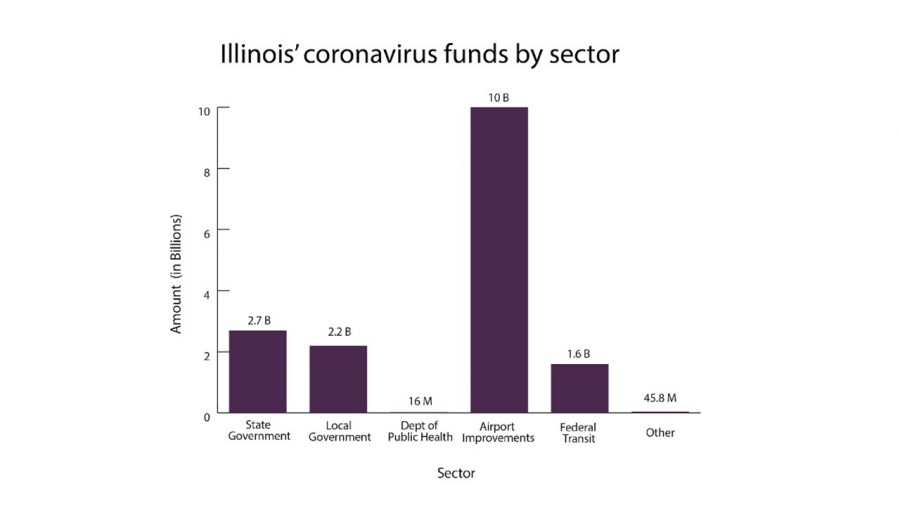Stimulus bill to fund Evanston school districts, child care programs
Illinois will receive $4.9 billion total to support state and local governments. Aside from government, Illinois sectors such as public health and transit will receive aid from the CARES Act.
April 16, 2020
Evanston/Skokie School District 65 and Evanston Township High School District 202 are slated to receive a total of $1.1 million in federal funding as part of the coronavirus stimulus bill. Local child care programs and businesses will also receive benefits.
Illinois will receive $4.9 billion in COVID-19 assistance for state and local governments. The Illinois state government is set to receive $2.7 billion from the Coronavirus Aid, Relief and Economic Security Act, and $2.2 billion from the act will benefit local governments statewide. The CARES Act, officially signed into law on March 27, allocates two trillion dollars nationwide for COVID-19 relief.
The CARES Act provides hundreds of millions of funding for the preschool program Head Start, public housing support, K-12 education and higher education.
D202 is set to receive $289,558 in funds and D65 will receive $799,518, according to preliminary estimates from Chalkbeat Chicago. Federal guidelines mandated the $569.5 million in Illinois school funding be distributed to each district by the number of low-income students.
Melissa Messinger, the D65 director of communications, said the funds will be used to subsidize technology costs. She said the district had already been working to support families with the transition to remote learning.
“We recognize the technology gaps and inequities that exist within our community,” Messinger wrote in a statement to The Daily. “It continues to be very important to district leaders that we are able to increase access to technology to better support learning opportunities for children while schools are closed.”
D65 began remote learning on March 16, and plans to continue until at least April 30, in order to comply with Gov. J.B. Pritzker’s stay-at-home guidelines. To ease students’ transition into a new learning format, the district is encouraging students to contact teachers during normal school hours and is providing a technology hotline.
The CARES Act also provides additional funding to existing child care programs. For example, the Child Care and Development Block Grant will receive $3.5 billion in funds, which will be distributed to child care providers.
According to a statement from the First Five Years Fund, the child care industry is experiencing layoffs and closures that could put locations permanently out of business, even as many are being asked to remain open to aid essential workers.
“Quality child care is an essential pillar of America’s labor market and economy,” the statement said. “The devastating impact of these closures on families and the ripple effect for the economy cannot be overstated.”
Local businesses were able to receive funds from the federal government until Thursday, when the cap for small business loans was reached. State Rep. Robyn Gabel (D-Evanston) said the funds allowed businesses to keep employees on their payroll. Maintaining the local workforce is particularly helpful, Gabel explained, as employed residents can continue to enjoy social security and insurance benefits from their employers.
Unemployed Evanston residents are eligible for “stimulus checks,” which amount to $600 a week. Checks can be claimed through either direct deposit or a physical check. Residents can determine if they are eligible to claim these funds by visiting the IRS website.
However, Gabel also said Evanston has been left out of disaster relief funding, a way for the federal government to assist cities in their efforts to battle the effects of domestic emergencies. Municipalities with fewer than 500,000 people do not qualify.
“All the towns that I represent as a legislator … will not be able to claim any of that disaster relief, even though they are having expenses just like everybody else’s,” Gabel said.
Email: [email protected]
Twitter: @juliaa_grace
Related Stories:
— “I’m doing my part:” the grocery store workers on the front lines of the pandemic
— Evanston shops feed residents, provide household supplies


